New Delhi – Congress MP Shashi Tharoor has voiced strong concerns regarding the recent $100,000 H-1B visa fee hike announced by US President Donald Trump. Tharoor On H-1B Visa Fee analysis suggests that while the measure aims to protect American workers, it may in fact harm the US economy by driving talent and jobs overseas.
Context behind the H-1B visa hike
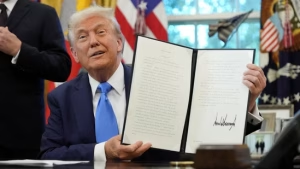
The Trump administration raised the H-1B visa application cost to $100,000 in an effort to prioritize American workers and curb dependency on foreign professionals. Indians and Chinese nationals make up a majority of H-1B visa holders, particularly in engineering and software sectors. Tharoor On H-1B Visa Fee remarks came at a time when the move has triggered anxiety among students and professionals aspiring to build careers in the United States.
Tharoor questions Trump’s assumptions


In his detailed statement, Tharoor On H-1B Visa Fee drew attention to the assumptions underlying Trump’s decision. He argued that if the aim is to deny opportunities to Indians and other foreign workers, the US must first ensure it has a sufficient talent pool. Tharoor noted that America does not produce enough engineering graduates and software professionals to fill these roles. Without adequate domestic capacity, he believes Trump’s strategy could weaken rather than strengthen the American workforce.
Wage assumptions and the hiring debate
Tharoor On H-1B Visa Fee analysis also touched on wage expectations. He explained that a foreign worker might accept $60,000 for a role where an American candidate would demand $80,000 or more. This wage gap has been used as a justification for curbing H-1B visas. However, Tharoor stressed that the assumption may not always reflect reality, as many foreign professionals bring highly specialized skills that the US market lacks.
Outsourcing risks for the US economy
According to Tharoor On H-1B Visa Fee, one of the biggest risks for America lies in job outsourcing. If companies are unable to bring skilled professionals into the US due to high visa costs, they may expand operations in other countries such as India, Ireland, or Germany. Tharoor emphasized that this would weaken the US economy, reduce innovation, and lead to a net loss of jobs domestically.
Why the rule may harm Trump politically
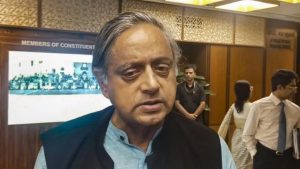

Tharoor On H-1B Visa Fee also carried a political warning for Trump. He suggested that the move could turn out to be an “own goal.” If American companies shift roles abroad, it may undermine Trump’s claim of protecting local jobs. Tharoor argued that the decision could fuel criticism from both Silicon Valley and Washington, where leaders recognize the essential role of foreign professionals in sustaining US competitiveness.
Also Read: Netflix Co-Founder Backs Trump’s H-1B Visa Fee: Bold Support Sparks Global Debate
White House justification for the policy
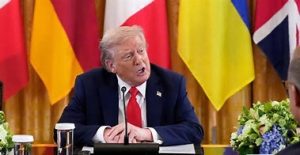

The White House fact sheet outlined three goals behind the new H-1B visa policy: protecting American jobs, combating abuses of the system, and prioritizing domestic workers. It cited examples of companies replacing thousands of American employees while simultaneously hiring thousands of H-1B workers. Tharoor On H-1B Visa Fee commentary challenged this framing, noting that without sufficient homegrown talent, the move will likely disrupt the economy.
Impact on Indian professionals
Indians form the largest share of H-1B visa holders, especially in IT services. Tharoor On H-1B Visa Fee highlighted that the fee hike would directly impact Indian students and professionals pursuing opportunities in the US. Many aspiring to achieve the “American Dream” now face financial and career uncertainties. This could also strain India-US relations as economic cooperation depends heavily on the movement of skilled talent.
National security and workforce strategy
Supporters of the fee argue that over-reliance on foreign workers discourages American students from pursuing STEM fields. They claim it creates long-term national security risks. However, Tharoor On H-1B Visa Fee pointed out that forcing restrictions without strengthening education pipelines in the US is counterproductive. He emphasized that building an adequate domestic workforce takes time and investment, not sudden barriers.
Global implications of the visa fee hike
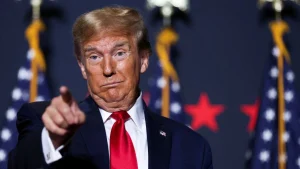

The H-1B program has been central to the global flow of talent, particularly in technology. Tharoor On H-1B Visa Fee reflects broader concerns in the global business community. By making the US less attractive, other countries such as Canada, Germany, and the UK may benefit by attracting skilled Indian and Chinese professionals. This shift could reduce America’s dominance in technology-driven sectors.
Conclusion: A costly experiment
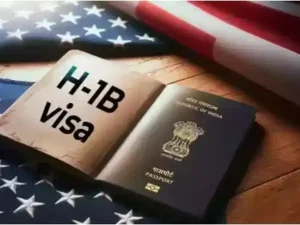

Tharoor On H-1B Visa Fee captures the growing debate on whether Trump’s $100,000 policy will truly protect American jobs or backfire by pushing them abroad. With limited domestic talent and heavy reliance on skilled foreign workers, the measure may destabilize the very sectors it intends to safeguard. Tharoor’s warning underscores that without balanced policies, the US risks weakening its workforce and global competitiveness.

